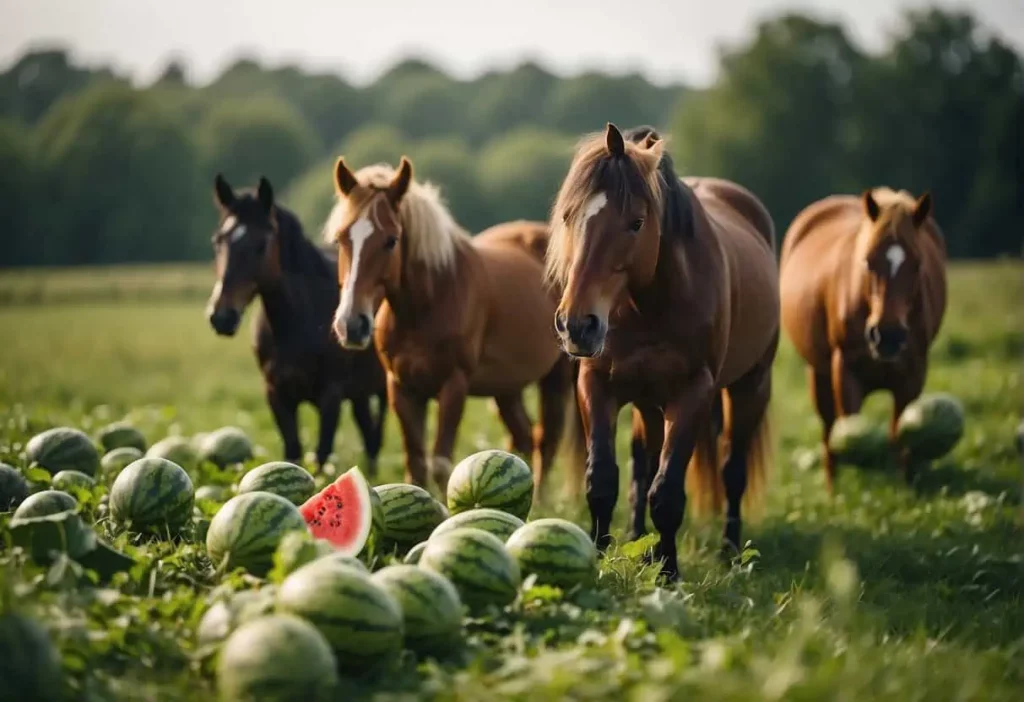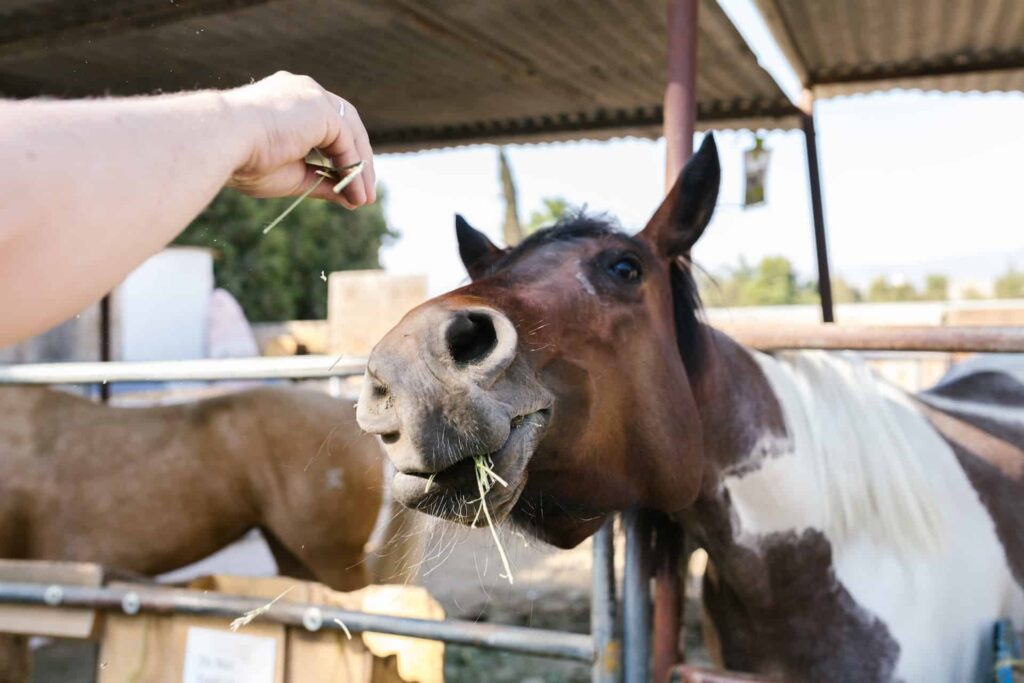Watermelon is often seen as a refreshing treat for humans, but what about horses? This juicy fruit can indeed be incorporated into a horse’s diet. Watermelon is generally safe for horses to eat in moderation.
It provides hydration and nutritional benefits that can complement the dietary needs of equine friends. However, as with any treat, it’s important to understand the proper way to feed watermelon to horses to ensure their safety and health.
The key to including watermelon in a horse’s diet is to recognize the animal’s overall nutritional requirements and balance them accordingly.
Watermelon can be a source of vitamins, such as vitamin C, and is composed mostly of water, which can help in hydrating horses, especially during hot weather.
Care should be taken to remove the seeds and rind to prevent any potential choking hazards or digestive issues. Horse owners should always consider individual dietary needs and any specific health concerns that may necessitate moderation or avoidance of certain treats, including watermelon.
Key Takeaways
- Watermelon is safe for horses to eat in moderation and can provide hydration and vitamins.
- It’s important to remove seeds and rind from watermelon to prevent choking or digestion issues for horses.
- Horses have varying dietary needs, so treats like watermelon should be given considerately, respecting any individual health concerns.
Equine Nutritional Needs
Horses require a balanced diet consisting of carbohydrates, proteins, fats, vitamins, and minerals to maintain optimal health.
They are natural foragers, and their digestive systems are designed to process a fiber-rich diet.
Primary Diet:
- Grass and Hay: These are the staples of a horse’s diet and should be good quality, providing sufficient fiber.
- Grains: These can be offered in moderation to meet the energy requirements, especially for working horses.
Vitamins and Minerals:
- Vitamin A: Essential for horses, it is often available in adequate quantities in fresh grass but may need to be supplemented with hay diets.
- Vitamins: A balanced intake of vitamins is critical, but over-supplementation can be harmful.
- Minerals: Horses need a variety of minerals including calcium and phosphorus for bone health, and trace minerals such as zinc and selenium.
Fruits and Sugars:
- Fruits like carrots and apples are often used as treats and can provide additional vitamins and minerals.
- However, the sugar content in fruits should be considered, particularly for horses prone to metabolic issues.
Considerations for Feeding Fruits:
- Introduce new fruits, such as watermelon, slowly into their diet to assess any reactions.
- Fruits as Treats: Ensure that fruits are given in moderation due to their sugar content.
Incorporate a balanced assortment of high-fiber feed, and an adequate supply of clean water, and monitor each horse’s individual nutritional needs to ensure their well-being.
Also, make sure to tailor feed portions to the horse’s workload, age, and health status.
Health Benefits of Watermelon in Equine Diet
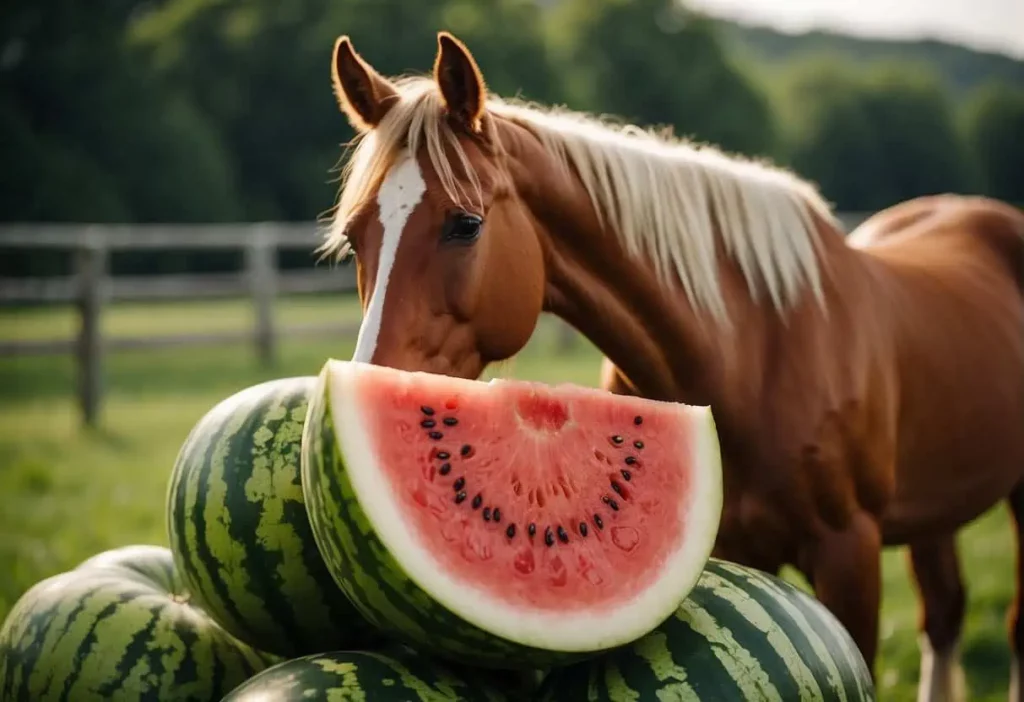
Watermelon is a nutritious fruit that can be a beneficial addition to a horse’s diet, offering hydration, essential vitamins and minerals, as well as important amino acids and antioxidants that support overall health.
Hydration and Water Content
Watermelon is an excellent hydration source for horses due to its high water content, which can help to prevent dehydration, especially during hot weather.
The fruit is made up of approximately 90% water, making it ideal for supplying extra fluids to equines.
Vitamins and Minerals in Watermelon
Watermelon is packed with a variety of vitamins and minerals essential for a horse’s health.
It offers Vitamin C, which supports the immune system and is a good source of potassium, useful for muscle function.
Additionally, it provides calcium and phosphorus, which are vital for maintaining bone health.
- Key Minerals:
- Potassium: Muscle function, water balance
- Calcium: Bone strength
- Phosphorus: Energy metabolism
Amino Acids and Antioxidants
The presence of amino acids like citrulline and arginine in watermelon is significant as they promote the production of nitric oxide, which helps with blood circulation and has anti-inflammatory effects.
Antioxidants combat oxidative stress, contributing to overall systemic health, including the digestive system and eye sight.
- Important Compounds:
- Citrulline: Converts to arginine; promotes blood flow
- Arginine: A precursor for nitric oxide; supports immune function
Watermelon, when fed in moderation, acts as a healthy treat providing not only hydration and energy but also contributing to the well-being of a horse’s immune and digestive systems.
Feeding Watermelon Safely to Horses
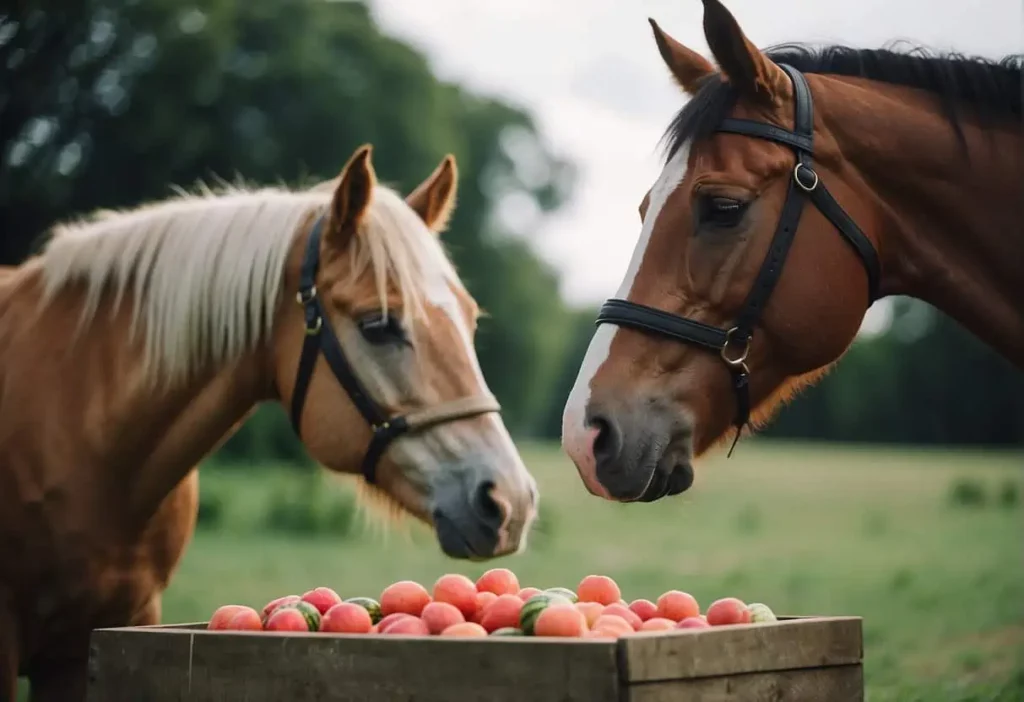
When feeding watermelon to horses, horse owners must assess both the benefits and potential risks, ensuring moderation and adherence to precautionary measures to maintain the well-being of their horses.
Risks of Watermelon Seeds and Rind
Seeds:
- Choke Risk: Watermelon seeds may cause choking if not chewed properly.
- Digestive Issues: Large amounts may contribute to colic or intestinal blockage.
Rind:
- Dental Concerns: The hard texture can cause dental problems in horses.
- High Sugar Content: It may contribute to conditions like laminitis.
- Hyperkalemic Periodic Paralysis (HYPP): Horses with HYPP should avoid watermelon rind due to its high potassium content.
Moderation is Key
- Sugar Levels: Watermelon is high in sugar, which should be limited in a horse’s diet.
- Portion Size: A few small chunks are enough. Overfeeding can lead to obesity and related health issues.
- Breed-Specific Disorders: Certain breeds prone to laminitis or HYPP require strict diet management.
Precautionary Measures
- Thorough Cleaning: Remove all traces of pesticides and herbicides that may harm the horse.
- Inspection for Contaminants: Check for mold or bacteria like E. coli that can cause serious illness.
- Supervision While Feeding: Ensure the horse chews properly to prevent choke.
Note: Always consult with a veterinarian before introducing new foods into your horse’s diet. Feeding practices may vary based on the individual horse’s health, age, and condition.
Alternative Treat Options
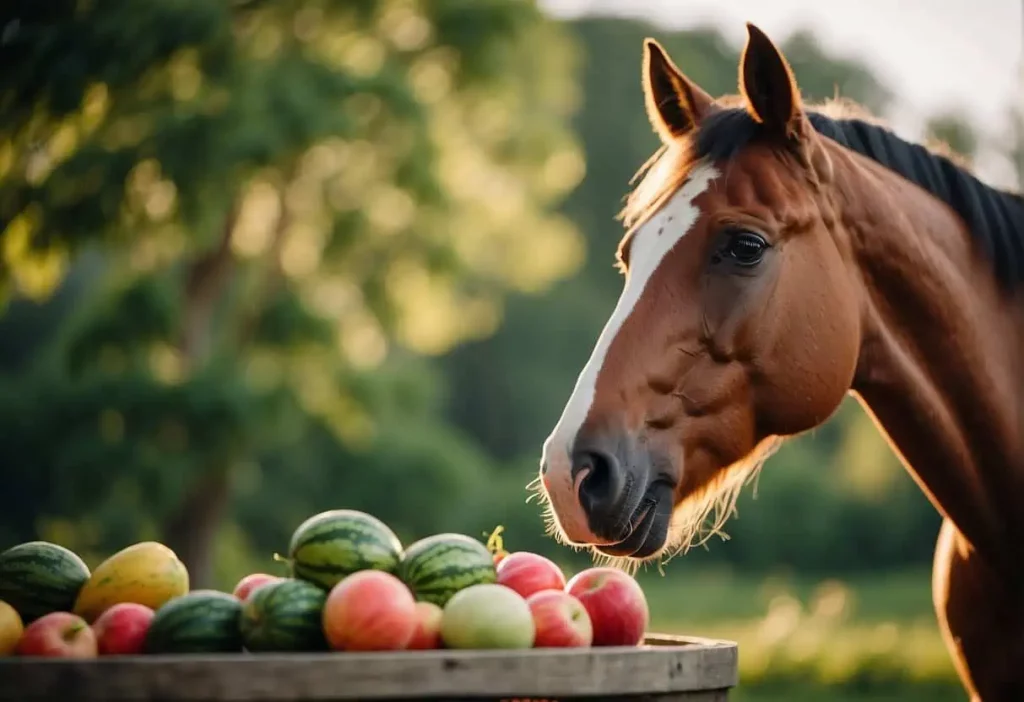
When considering horse treats, it’s important to include a variety that not only pleases their palate but also contributes to their nutritional needs.
Beyond watermelon, many fruits and vegetables serve as safe and enjoyable treats for horses. Here’s a curated list of alternatives:
- Carrots: A classic favorite, they are perfect for a crunchy snack.
- Apples: Sweet and satisfying, ensure they are cut into smaller pieces to prevent choking.
- Bananas: Rich in potassium, they can eat them with or without the peel.
Horses can also enjoy a diverse range of fruits in moderation:
- Grapes: Offer a juicy burst of flavor, but always feed in small quantities.
- Strawberries: A great source of antioxidants, but only as a special treat due to their sugar content.
- Pears & Oranges: High in vitamins, though oranges should be fed sparingly due to acidity.
- Mango: Must be peeled and pit removed as it can be a choking hazard.
Moreover, some vegetables are excellent treats:
- Pumpkin: Can aid in digestion, served in small, manageable portions.
- Sweet Potato: Cooked or raw, it’s packed with beneficial nutrients.
For a refreshing option during warmer months:
- Cantaloupe & Honeydew: Can be hydrating, but always remove the rinds and seeds first.
Always introduce new treats gradually and monitor your horse’s reaction to them.
Remember that while treats can be a delightful supplement to a horse’s diet, they should not constitute a significant portion of their diet, and horses with specific health issues may require dietary restrictions.
Special Dietary Considerations
When incorporating watermelon into a horse’s diet, several factors require careful consideration.
Owners should be aware of their horse’s unique nutritional needs and any health conditions that may affect the suitability of watermelon as a treat.
- Equine Nutrition: Watermelons can offer hydration and a small amount of vitamins, but they should not replace a balanced diet of forage, grains, and specialized equine feeds.
- Laminitis: Horses with a history of laminitis should consume watermelon cautiously. The sugar content, particularly in the rind, might contribute to the risk of flare-ups.
- Equine Cushing’s Disease/Pituitary Pars Intermedia Dysfunction: Horses with these conditions are prone to insulin dysregulation. The sugar in watermelon could cause an imbalance; therefore, moderation is crucial.
- Insulin Resistance: Horses with insulin resistance should only have watermelon in very limited quantities if at all, due to its natural sugars that can lead to an insulin spike.
- Hyperkalemic Periodic Paralysis (HYPP): Due to the potassium in watermelon, horses with HYPP should not be fed watermelon, as it can exacerbate this condition.
In general, small amounts of watermelon flesh can be a safe treat.
However, seeds should be removed to prevent potential choking hazards, and the consumption of the rind should be limited to avoid digestive issues.
Feeding should also be monitored for any adverse reactions, such as changes in bowel movements or signs of colic.
Watermelon can be a refreshing treat for horses, especially during hot weather, but it’s essential to consider the individual horse’s dietary needs and health concerns before adding it to their diet.
Creative Ways to Serve Watermelon
When considering watermelon as a horse treat, offering it in a way that is both safe and appealing for the animals is key.
As a healthy treat, watermelon can be incorporated into a horse’s diet in various forms.
One of the simplest methods to offer watermelon to horses is by cutting it into watermelon chunks.
These bite-sized pieces are easy for horses to eat and can be a refreshing snack, especially on hot days.
Alternatively, watermelon cubes can be mixed into the horse’s usual feed to add a sweet surprise.
These cubes can be served fresh or frozen, which can help in cooling the horse down during summer.
For horse owners looking to get creative, bran mash with watermelon combines the nutritional benefits of bran with the hydrating properties of watermelon.
This mixture can encourage horses to enjoy their mash while obtaining additional hydration and nutrients.
Another innovative option is creating watermelon popsicles by freezing pureed watermelon or small watermelon pieces in ice cube trays.
These can then be given to horses as a frozen treat to lick and enjoy, which is especially beneficial when trying to keep them cool and entertained.
It’s important to remove all seeds from the watermelon before serving, as they can be a choking hazard or cause digestive issues for horses.
By offering seedless watermelon in these various forms, one can ensure horses enjoy a delightful and safe snack.
Please note: Always introduce any new food, including watermelon, gradually into a horse’s diet and consult with a veterinarian if there are any concerns or questions.
Understanding Equine Dietary Reactions
When determining if horses can eat watermelon, it’s essential to consider the typical dietary reactions of these equine friends.
Watermelon is generally safe for horses to consume in moderation. It is a hydrating fruit with high water content, which can be a refreshing treat, particularly during hot weather. However, knowing the limits and observing adverse reactions is crucial.
The flesh of watermelon is good for horses, as it’s low in calories and free from any harmful substances, but owners should remove the seeds to prevent potential digestive issues.
The rind, though not toxic, is tough and may be more difficult for a horse to digest, so it should be offered cautiously and in small quantities.
Here is a brief overview of watermelon as a food item for horses:
- Edible Parts: Flesh (seedless)
- Questionable Parts: Rind (offer minimally)
- Inedible Parts: Seeds (remove to avoid choking)
Owners should introduce watermelon—or any new treat—gradually into their horse’s diet to monitor for signs of intestinal discomfort or allergic reactions.
Initial offerings should be small, watching for signs of colic or changes in stool.
While horses eat watermelon and often enjoy it, each horse is unique. Some might show sensitivity or disinterest, while others happily consume the fruit.
Above all, watermelon or any treat should never replace the primary forage, grains, and supplements that comprise the bulk of a horse’s diet.
Moderation is key, and when in doubt, a veterinarian should be consulted to ensure the safety and health of your horse.
Frequently Asked Questions
When considering if horses can eat watermelon, it’s essential to examine safety, dietary integration, potential risks, preparation methods, health implications, and appropriate serving sizes.
Is watermelon safe for horses to consume?
Watermelon is generally safe for horses, providing a hydrating treat with high water content and essential nutrients.
Can horses have watermelon as part of their diet?
Yes, horses can have watermelon as a part of their diet, but it should be offered in moderation as a treat alongside their regular feed.
Are there any parts of watermelon that horses should avoid?
Horses should avoid consuming the hard green rind and seeds of watermelon to prevent possible digestive issues.
How should watermelon be prepared for horse consumption?
Watermelon should be cut into small, manageable chunks to ensure easy consumption and reduce the risk of choking.
Are there health benefits or risks for horses eating watermelon?
Watermelon provides hydration and essential vitamins for horses but can pose a risk of colic if fed in excessive amounts.
What quantity of watermelon is appropriate for a horse to eat?
A recommended quantity is a few small chunks of watermelon as an occasional treat. Make sure it does not exceed 10% of the horse’s overall diet.
Last Updated on February 22, 2024 by Nate Dewsbury
